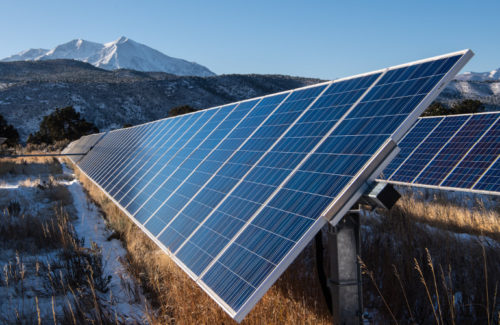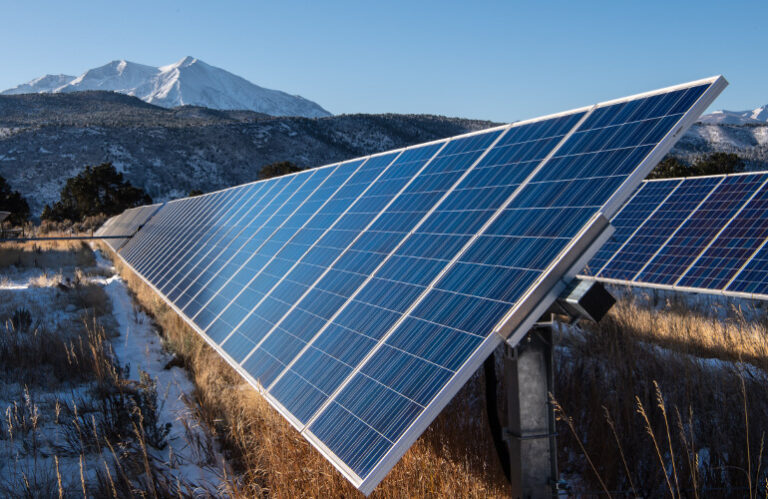
Photo by Dennis Schroeder/NREL
A bipartisan group of Colorado lawmakers has introduced a bill to significantly expand access to the clean energy transition through a revitalization of the state’s community solar program. Senate Bill SB24-207, introduced by Senate President Steve Fenberg (D-Boulder), comes at a time of unprecedented federal funding opportunities through the Biden administration’s Inflation Reduction Act. This bill calls for a revamped community solar program that will allow Colorado to secure hundreds of millions of federal dollars to improve the state’s electric grid, promote energy equity, and reduce energy costs for residents.
Most Colorado households cannot take advantage of rooftop solar due to barriers such as homeownership and credit score requirements. Community Solar provides renters, nonprofits, small businesses, and low-to-moderate income (LMI) customers with immediate access to the clean energy transition and energy bill savings. Colorado was the first state in the nation to pass community solar legislation in 2010, but has since fallen behind other states with more modern program designs. Currently, only 1% of Xcel’s 1.6 million customers – and only 3,300 of them are income-qualified households – can participate in community solar due to the program’s limited size and outdated policy framework.
This bill improves Colorado’s community solar program by adopting best practices from more than twenty states. More specifically, the bill states:
- Delivers meaningful bill savings to thousands more income-qualified households;
- Reserves at least 51% of each community solar project for income-qualified residential subscribers, which is a leading requirement in the country and is tailored to the Inflation Reduction Act to maximize federal dollars flowing into the state;
- Enhances subscriber experiences with best sign-up practices, consumer protection, and consolidated billing;
- Prioritizes projects in preferred locations, such as rooftops and brownfields, and encourages dual-use practices, such as agriculture; And
- Improves the methods by which third-party stakeholders can develop community solar projects with investor-owned utilities.
- Organizations and advocates from across Colorado are applauding the bill’s introduction, optimistic about the opportunities it presents beyond federal funding options.
“All Coloradans, regardless of income level or homeownership status, should be able to participate in the renewable energy transition,” said Senate President Steve Fenberg, sponsor of SB24-207. “This important bill removes barriers to access to solar energy – such as homeownership or credit score requirements – to ensure renters, nonprofits and small businesses can participate without breaking the bank. With unprecedented federal funding opportunities through President Biden’s Inflation Reduction Act, now is the time to reinvigorate Colorado’s community solar program and ensure our state remains a leader in renewable, clean energy.”
“Regardless of whether you are a renter or homeowner, regardless of income level or credit score, all Coloradans should benefit from clean energy projects that keep our air clean and lower our energy bills – especially in the communities most targeted by polluters,” said Tom Abood. , Leader of Together Colorado’s Climate Justice Committee. “SB24-207 will do all this by prioritizing community solar in disproportionately impacted communities, guaranteeing working families a 20% – 40% reduction in electric bills, and helping Colorado reach its renewable energy goals . Our collective faith traditions teach us to care for our planet and the most vulnerable among us – and in this spirit we urge our lawmakers to support this bill.”
Senate bill SB24-207 is expected to be reviewed by the Senate Transportation and Energy Committee before moving to the Senate Appropriations Committee and then to the floor for a vote by the full Senate.
Over the past decade, the number of states that have enacted policies supporting third-party shared or community solar has expanded from just a few to 22 states, including Washington, DC. Collectively, 6.6 gigawatts (GW) of generating capacity have been installed as of date, and Wood Mackenzie’s latest US community solar market prospects predicts there will be 14 GWDC power installed across the country by the end of 2028.
“Community solar is the best way to democratize solar energy and lower the barrier to access to clean, affordable energy,” said Kevin Cray, Mountain West Senior Director of the Coalition for Community Solar Access (CCSA). “With the opportunity to leverage billions of federal dollars into Colorado’s community solar program, now is the perfect time to upgrade our program and set a new national standard for equitable clean energy policies.”
News item from the Coalition for Community Solar Access


